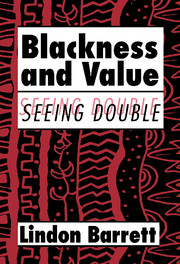4 - De-Marking Limits: Reading New Critical Bla(n)ckness
Published online by Cambridge University Press: 18 December 2009
Summary
It may seem a radical shift in focus to turn from considerations of the alterity symbolized by African American musical production to the scope and kinds of attention underwriting the literary academy. The shift seems not so radical, however, when one reflects that, “as the NCTE [National Council of Teachers of English] survey accurately shows, by the end of the 1950s, one could study American literature and read no work by a black writer, few works by women except Dickinson and perhaps Marianne Moore or Katherine Anne Porter, and no work about the lives and experiences of working-class people” (Lauter 27). In other words, the established circulation of signs of value investing itself in racial and other forms of exclusion obtains equally at the site of the academy. Exclusionary arrangements of “knowledge” superintended by the academy – the paramount site of literacy and the life of the mind as they are popularly understood – reiterate hostile configurations of value challenged by the alterity of the singing voice and interrogated at length in Ann Perry's The Street. The seemingly unbridgeable disparity between the performance of an honorific critical appraisal on a limited selection of objects and the ludic, excessive performance of the singing voice reiterates the forgery of radical difference already outlined. Upon closer examination, one recognizes the fashioning and refashioning of relationships across boundaries and borders, as one does at all sites of value.
- Type
- Chapter
- Information
- Blackness and ValueSeeing Double, pp. 131 - 182Publisher: Cambridge University PressPrint publication year: 1998



